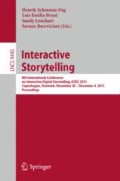Abstract
Here we introduce a theoretical framework for investigation of the cognitive and semiotic nature of digital storytelling. Our approach analyzes e-picturebooks (digital picturebooks) as cognitive artifacts and their impact on cognitive niche construction. Cognitive artifacts have the power both to create new problems and to create means for solving these problems. When both these aspects are taken into account, cognitive artifacts can be seen as shaping cognition itself: endowing it with both needs and capabilities, creating ever more specialized tools to deal with ever more specialized tasks. We investigate (i) how the problem space of storytelling is structured on cognitive artifacts, (ii) what are the specific semiotic features of e-picturebooks and how these features can alter storytelling production and interpretation, and (iii) how these alterations influence general cognitive abilities regarding storytelling tasks.
Access this chapter
Tax calculation will be finalised at checkout
Purchases are for personal use only
References
Laland, K., Kendal, J.R., Brown, G.R.: The niche construction perspective: implications for evolution and human behaviour. J. Evol. Psychol. 5(1–4), 51–66 (2007)
Sterelny, K.: Thought in a Hostile World: The Evolution of Human Cognition. Wiley-Blackwell, Oxford (2003)
Skagestad, P.: Peirce’s semeiotic model of the mind. In: Misak, C. (ed.) The Cambridge Companion to Peirce, pp. 241–256. Cambridge University Press, Cambridge (2004)
Skagestad, P.: Thinking with machines: intelligence augmentation, evolutionary epistemology, and semiotic. J. Soc. Evol. Syst. 16(2), 157–180 (1993)
Norman, D.: Things that Make us Smart. Perseus Books, Cambridge (1993)
Hutchins, E.: Cognition in the Wild. The MIT Press, Cambridge (1995)
Clark, A.: Language, Embodiment, and the Cognitive Niche. Trends Cogn. Sci. 10(8), 370–374 (2006)
Clark, A.: Word, niche and super-niche: how language makes minds matter more. Theoria 20, 255–268 (2005)
Clark, A.: Being There: Putting Brain, Body, and World Together Again. The MIT Press, Cambridge (1998)
Stotz, K.: Human nature and cognitive-developmental niche construction. Phenom. Cogn. Sci. 9, 483–501 (2010)
Pinker, S.: The cognitive niche: coevolution of intelligence, sociality, and language. Proc. Nat. Acad. Sci. U.S. America 107(2), 8993–8999 (2010)
Clark, A.: Supersizing the Mind: Embodiment, Action, and Cognitive Extension. Oxford University Press, New York (2008)
Dreyfus, H.L.: Intelligence without representation: merleau-ponty’s critique of mental representation: the relevance of phenomenology to scientific explanation. Phenom. Cogn. Sci. 1, 367–383 (2002)
Wheeler, M.: Reconstructing the Cognitive World: The Next Step. The MIT Press, Cambridge (2005)
Chemero, A.: Radical Embodied Cognitive Science. The MIT Press, Cambridge (2009)
Herman, D.: Storytelling and the Sciences of Mind. The MIT Press, Cambridge (2013)
Queiroz, J., El-Hani, C.: Downward determination in semiotic multi-level systems. Cybern. Hum. Knowing 19(1–2), 123–136 (2012)
Author information
Authors and Affiliations
Corresponding author
Editor information
Editors and Affiliations
Rights and permissions
Copyright information
© 2015 Springer International Publishing Switzerland
About this paper
Cite this paper
Estefani, T., Atã, P., Queiroz, J. (2015). How Cognitive Niche Construction Shapes Storytelling?. In: Schoenau-Fog, H., Bruni, L., Louchart, S., Baceviciute, S. (eds) Interactive Storytelling. ICIDS 2015. Lecture Notes in Computer Science(), vol 9445. Springer, Cham. https://doi.org/10.1007/978-3-319-27036-4_33
Download citation
DOI: https://doi.org/10.1007/978-3-319-27036-4_33
Published:
Publisher Name: Springer, Cham
Print ISBN: 978-3-319-27035-7
Online ISBN: 978-3-319-27036-4
eBook Packages: Computer ScienceComputer Science (R0)

